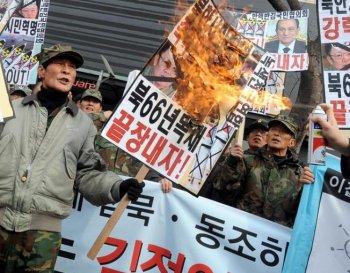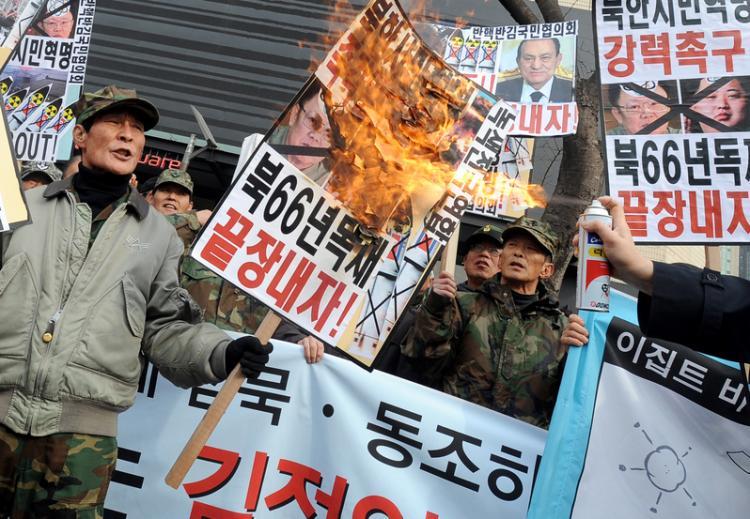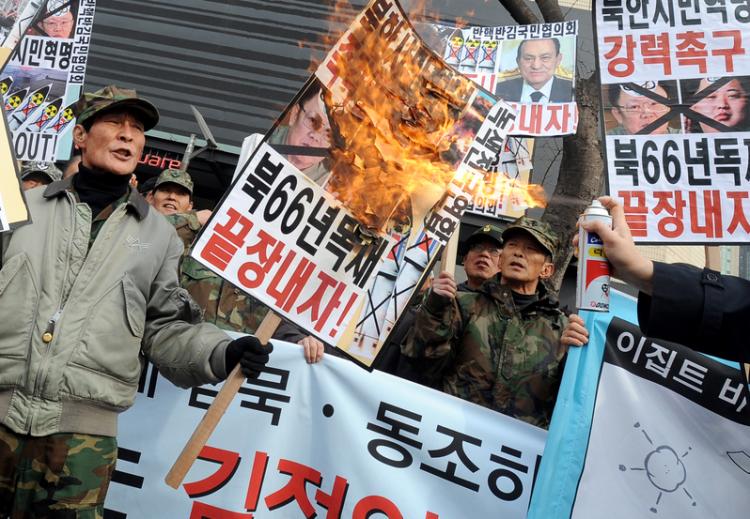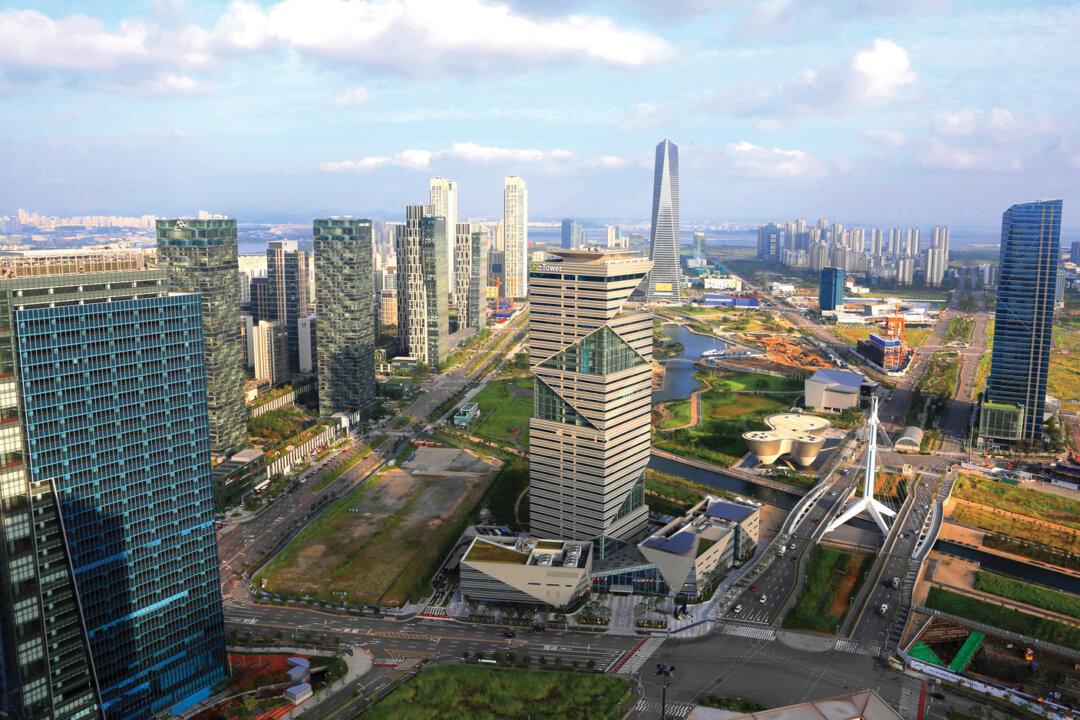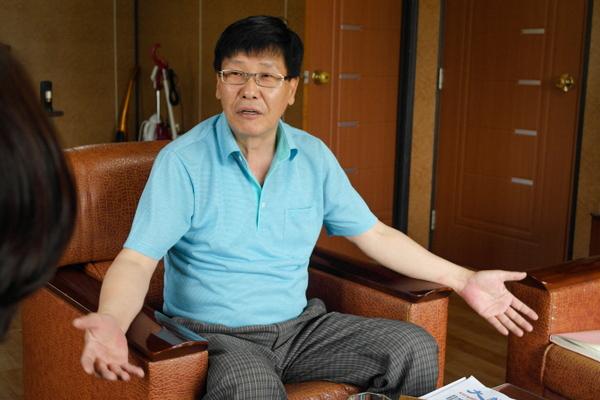SEOUL, South Korea—Inspired by news from Egypt, several protests have flared up in North Korea. Regime leader Kim Jong Il has ordered a riot squad alert, and China’s Minister of Public Security is said to have advised Pyongyang on how to deal with possible mass uprisings.
Two days after Mubarak’s resignation, Meng Jianzhu, China’s Minister of Public Security, made a trip to Pyongyang and discussed ways of preventing anti-regime protests in North Korea, the Korea Joongan Daily reported on Feb. 22.
Meng shared tips on cell phone wiretapping with North Korean authorities. Shortly thereafter, North Korea began cell phone wiretapping and tightened control on cell phone use, including suspending cell phone rental services to foreign tourists.
Despite joint efforts by Chinese and North Korean regime leaders to tightly censor and control the flow of news, North Koreans did obtain news of the Egyptian antigovernment protests through Chinese television broadcasts and through North Korean defectors. The ousting of Mubarak is a hot topic in North Korea, the Chosun Ilbo reported on Feb. 23.
Many small-scale protests erupted in North Korea around Feb. 16, Kim Jong Il’s birthday.
On the night of Feb. 14, residents of Jongju, Yongchon, and Sonchon Counties in Pyongan Province protested in the streets. They shouted, “Give us electricity, give us rice!” Apparently the electricity had been cut short and transferred to Pyongyang for Kim Jong Il’s birthday celebration, according to a report by Chosun Ilbo on Feb. 23.
On Feb. 18, hundreds of people clashed with security forces in the North Korean town of Sinuiju, on the border with China, where police officers are said to have beaten a trader unconscious. The victim’s family, supported by many other traders, protested the mistreatment. The military was called to quell the demonstration, leaving a number of protesters wounded, with four or five people rumored to have been killed, Chosun Ilbo said in another report on Feb. 24.
In Chongjin in North Hamgyong Province, a group of angry residents stoned the city’s chief security officer to death on Feb. 23, South Korea’s Yonhap News reported on Feb. 24.
Kim Jong Il ordered severe protest control. The People’s Safety Ministry in each area has begun organizing riot squads of around 100 people and is tracking down any sign of unrest, the Daily NK said on Feb. 24.
But unlike in the past, North Koreans are no longer reporting on each other when investigated by authorities. Instead they are standing up for each other.
When questioned by Public Security personnel, people all told them: “I was scared and hid at home. I don’t know who participated.” Authorities were therefore unable to find the protest leader, Chosun Ilbo said.
International aid agency officials say they saw severe food shortage and alarming malnutrition in North Korea. People have to eat grass roots as the cold weather has killed half of the wheat and barley crops, BBC Chinese reported on Feb. 24.
In addition to China’s Minister of Public Security offering special tips to its North Korean communist ally on how to tighten control over its long-suffering people, China recently also blocked the release of a report on U.N. sanctions on North Korea.
On Feb. 23, the U.N. Security Council (UNSC) held a closed-door meeting to discuss a report on North Korea’s uranium enrichment program submitted by a U.N. panel of experts on North Korea, and urging additional sanctions, BBC Chinese reported on Feb. 24.
Diplomats who attended the meeting said many U.N. council members supported the release of the report, stressing that all 192 U.N. member states should be informed about the report’s findings. However, UNSC failed to release the report due to opposition from China, the report said.
[email protected]
Two days after Mubarak’s resignation, Meng Jianzhu, China’s Minister of Public Security, made a trip to Pyongyang and discussed ways of preventing anti-regime protests in North Korea, the Korea Joongan Daily reported on Feb. 22.
Meng shared tips on cell phone wiretapping with North Korean authorities. Shortly thereafter, North Korea began cell phone wiretapping and tightened control on cell phone use, including suspending cell phone rental services to foreign tourists.
Despite joint efforts by Chinese and North Korean regime leaders to tightly censor and control the flow of news, North Koreans did obtain news of the Egyptian antigovernment protests through Chinese television broadcasts and through North Korean defectors. The ousting of Mubarak is a hot topic in North Korea, the Chosun Ilbo reported on Feb. 23.
Hunger and Repression
Many small-scale protests erupted in North Korea around Feb. 16, Kim Jong Il’s birthday.
On the night of Feb. 14, residents of Jongju, Yongchon, and Sonchon Counties in Pyongan Province protested in the streets. They shouted, “Give us electricity, give us rice!” Apparently the electricity had been cut short and transferred to Pyongyang for Kim Jong Il’s birthday celebration, according to a report by Chosun Ilbo on Feb. 23.
On Feb. 18, hundreds of people clashed with security forces in the North Korean town of Sinuiju, on the border with China, where police officers are said to have beaten a trader unconscious. The victim’s family, supported by many other traders, protested the mistreatment. The military was called to quell the demonstration, leaving a number of protesters wounded, with four or five people rumored to have been killed, Chosun Ilbo said in another report on Feb. 24.
In Chongjin in North Hamgyong Province, a group of angry residents stoned the city’s chief security officer to death on Feb. 23, South Korea’s Yonhap News reported on Feb. 24.
Kim Jong Il ordered severe protest control. The People’s Safety Ministry in each area has begun organizing riot squads of around 100 people and is tracking down any sign of unrest, the Daily NK said on Feb. 24.
But unlike in the past, North Koreans are no longer reporting on each other when investigated by authorities. Instead they are standing up for each other.
When questioned by Public Security personnel, people all told them: “I was scared and hid at home. I don’t know who participated.” Authorities were therefore unable to find the protest leader, Chosun Ilbo said.
International aid agency officials say they saw severe food shortage and alarming malnutrition in North Korea. People have to eat grass roots as the cold weather has killed half of the wheat and barley crops, BBC Chinese reported on Feb. 24.
China Blocks Nuclear Report
In addition to China’s Minister of Public Security offering special tips to its North Korean communist ally on how to tighten control over its long-suffering people, China recently also blocked the release of a report on U.N. sanctions on North Korea.
On Feb. 23, the U.N. Security Council (UNSC) held a closed-door meeting to discuss a report on North Korea’s uranium enrichment program submitted by a U.N. panel of experts on North Korea, and urging additional sanctions, BBC Chinese reported on Feb. 24.
Diplomats who attended the meeting said many U.N. council members supported the release of the report, stressing that all 192 U.N. member states should be informed about the report’s findings. However, UNSC failed to release the report due to opposition from China, the report said.
[email protected]
